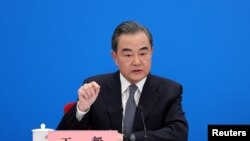Chinese Foreign Minister Wang Yi is warning the West and other players that “no external interference will be tolerated” as Beijing considers a new security law inside semi-autonomous Hong Kong.
“Excessive unlawful foreign meddling in Hong Kong affairs has placed China’s national security in serious jeopardy,” Wang said at a news conference Sunday.
He said the proposal “does not affect the rights and freedoms enjoyed by Hong Kong residents. And it does not affect the legitimate rights and interests of foreign investors in Hong Kong.”
He said people are becoming “unnecessarily worried” about the new security arrangements.
“People should have more confidence,” he said, while at the same time making it clear that China has “principles and guts. We will push back against any deliberate insult to resolutely defend our national honor and dignity and we will refute all groundless slander with facts.”
The new law would ban what Chinese authorities regard as secessionist, subversive, and what they call terrorist activities inside Hong Kong which Beijing says threatens national security.
The Chinese parliament is widely expected to rubber-stamp its approval later this week.
U.S. National Security Adviser Robert O’Brien told CBS’s Face the Nation Sunday that China is facing U.S. sanctions if it carries out the proposal.
“And I can’t see how Hong Kong remains the Asian financial center if the Chinese Communist Party goes through and implements this national security law and takes over Hong Kong,” O'Brien said.
Secretary of State Mike Pompeo has called it the “death knell” for Hong Kong autonomy.
In Hong Kong on Sunday, police fired tear gas and water cannons at pro-democracy demonstrators against the new law. About 180 people were arrested.
Governments around the world have been strongly criticizing China since it announced the legislation Friday, saying it directly violates the “one country-two systems” treaty under which Hong Kong has operated since China took over the territory from Britain in 1997.
The U.S. has long supported and promoted Hong Kong’s high-level of autonomy, including bilateral trade and investment agreements.













